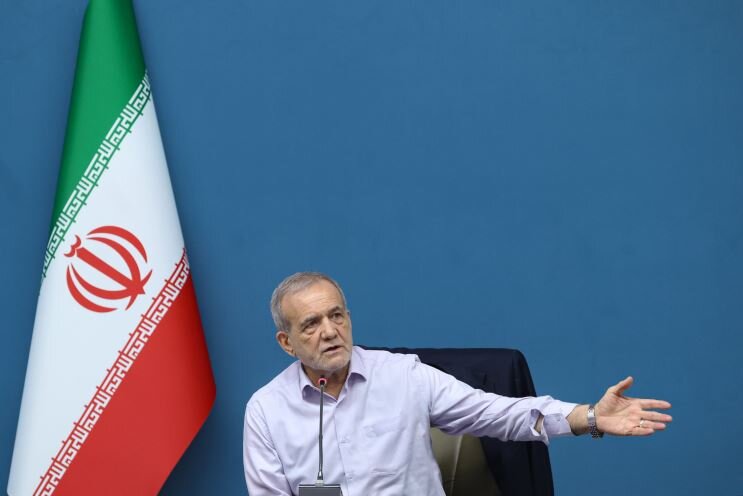Iran will not walk back its principles in nuclear talks with US, says Pezeshkian

TEHRAN – Iran’s President Masoud Pezeshkian has said his country will stoutly defend its rights and maintain its red lines during nuclear talks with the United States, as the two sides approach a fifth round of the indirect negotiations under the mediation of Oman.
“Indirect talks with the U.S. are being conducted in full coordination with Leader of the Islamic Revolution Ayatollah Seyyed Ali Khamenei,” Pezeshkian said during a gathering with independent parliament members. “And Iran will not retreat from its principles during this process.”
Pezeshkian also stated on Tuesday that his administration will not allow the daily lives and prosperity of Iranian citizens to be solely dependent on the outcome of the negotiations with the United States.
The talks come after U.S. President Donald Trump withdrew from an international nuclear deal named JCPOA in 2018 and subsequently imposed sanctions against Iran. The JCPOA offered Tehran sanctions relief in exchange for caps on its nuclear activities.
In his first term, Trump had hoped to add restrictions on Iran's military and foreign policy to any nuclear agreement, but he seems to have since retreated from those objectives. Analysts believe he may still be musing on a potential cessation of uranium enrichment in Iran – something Tehran has already described as a non-starter. Iran’s Foreign Minister Seyyed Abbas Araghchi recently noted that Iran has the right to enrich uranium under the Treaty on the Non-Proliferation of Nuclear Weapons (NPT).
On Sunday, Iranian negotiators, under the leadership of Araghchi, held a fourth round of talks in Muscat with a U.S. delegation headed by President's Special Envoy Steve Witkoff. So far, the discussions have been characterized by both parties as positive and demonstrating progress.
The last round of the talks came in the shadow of controversial remarks by Witkoff, who had told an American media outlet earlier in the week that Iran should dismantle some of its nuclear facilities and stop the enrichment of uranium. Given the fact that a fifth round has been scheduled, Witkoff likely did not bring up those demands during the Sunday convention in Muscat.
Iran’s Deputy Foreign Minister for Political Affairs, Majid Takht-e-Ravanchi, who is part of the country’s negotiating team, told journalists during a book-signing event in Tehran that remarks similar to Witkoff’s controversial ones will erode trust in the ongoing diplomatic process.
“A big issue that exists is the fact that we keep hearing contradictory positions from the American side. This makes everything significantly harder than it must be.” The diplomat said the location and time of the next round of the discussions have yet to be determined, but added that Iran will proceed “with its eyes open”.
Takht-e-Ravanchi said another unconstructive approach by the U.S. is its continued clinging to the so-called maximum pressure campaign. “Sanctions are putting pressure on different segments of the population. Our effort in the diplomatic apparatus is to do our best to eliminate the sanctions within the framework of the country's policies,” he explained. Washington has renewed already debilitating sanctions against Iran multiple times since the talks started in early April, with its last such announcement coming on Monday.
Meanwhile, International Atomic Energy Agency (IAEA) Director General Rafael Grossi is attempting to wedge himself into the bilateral discussions. He recently told an Argentine media outlet that even the most extensive military campaign would not be able to completely destroy Iran’s nuclear infrastructure, and that Tehran is a large country capable of rebuilding its facilities. The IAEA chief also offered to share his “knowledge” of Tehran’s nuclear program with Washington’s negotiating team.
The Tehran Times previously learned that the European Troika (Britain, France, Germany) has directed IAEA Director General Grossi to hinder diplomacy between Iran and the U.S. In exchange for his assistance, the European signatories to the JCPOA, said to be griping about their exclusion from the talks, promised Grossi their backing in his pursuit of the United Nations Secretary-General position.
Leave a Comment